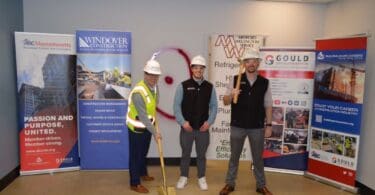Providence, RI – Vision 3 Architects of Providence is known for their sustainable approach to design. Although not every project the firm designs is designed for LEED certification, Vision 3 works closely with each client to integrate sustainable design elements to fit their unique project and budget goals.
In 2008, Anthony Bodine of Cranston approached Vision 3 with an innovative idea: to design his new company, Protech Automotive Services, as a “green” auto repair shop on Plainfield Pike in Johnston. Bodine wanted to provide customer, and environmentally friendly automotive services, in a sleek, high-end setting that had a European feel.
“I chose to open a “green” shop because I felt there was no other way,” commented Bodine. “The entire automotive industry is going green; the car manufacturers, the parts suppliers, collision repair, etc. It’s time that the auto repair industry gets cleaned up. Protech will set the bar, and hopefully other shops will follow. “Green repair” will soon be the new standard.”
A unique building design, Protech’s exterior is built using a combination of black and white, ground face concrete block, where each color defines different programmatic elements within the building. The main entrance features a high-recycled content, aluminum metal panel system prefinished in the company’s signature neon green. The neon green metal panels are also used throughout the building as a complementary accent to the black and white concrete block.
Vision 3 specified a white thermoplastic polyolefin (TPO) roof to reflect sunlight, and minimize the heat-island effect created by black roofs. This small but significant change in the building design will save Protech roughly 30% in heating, cooling, and ventilation expenses.
Protech’s two oil change bays are located in the front of the building to the right of the entrance. This allows customers quick, in-and-out access. Running along the length of the building are six service bays with glass overhead doors. This, when combined with skylights above each service bay, provides ample natural light. On bright, sunny days technicians can turn off the overhead lighting and rely on daylight. In addition, operable windows across from each overhead door allow for cross ventilation and passive cooling on mild days.
As an integral feature of Protech’s sustainable design, Vision 3 specified a boiler that can be fueled by recycled waste oil that is typically discarded. At Protech, all superfluous waste oil is stored in a holding tank where it is pumped to the boiler. Waste oil is filtered and burned as a heat source for the radiant floor heating system.
Protech’s signature neon green color is used with a bright orange, to create a lively and welcoming atmosphere for customers in the lobby and lounge areas. All interior and exterior paints are specified to be low V.O.C.
In addition, all restrooms use low-flow toilets and sensor operated faucets to reduce water consumption; and high velocity electric hand dryers to cut down on paper waste.
Additional sustainable elements:
· A waste management recycling program was used during construction.
· Lighting throughout the building is energy-efficient.
· Countertops are made from recycled glass bottles.
· Protech recycles almost every part or liquid that they replace, including antifreeze, oil based products, batteries, tires, oil filters, wheel weights, metal parts, paper, and more.
Protech Automotive Services’ new building was completed in March of 2010.
“The best part about the design is the transparency, in both green design and automotive service,” remarked Bodine. “From where the customers sit, they can see everything, with no obstructions. Most shops have a waiting room that is separate from the service bays, with walls that block the customer’s view of their vehicle. Our waiting room is separated from the service area by only glass walls. This creates a feeling of trust between customers and employees because nothing is hidden.”
Captions


